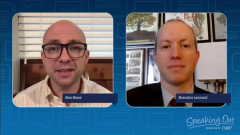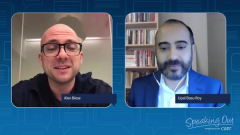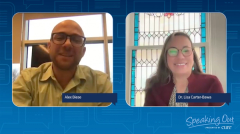
Why Government Action Matters for Patients with Cancer
As part of its Speaking Out video series, CURE® spoke with Brandon Leonard of the LUNGevity Foundation about the role legislation can play in a patient’s cancer journey.
Episodes in this series
While legislation and public policy may not be at the forefront of cancer patients' minds, they play a significant role in determining access to treatments, therapies, and follow-up care, according to Brandon Leonard, director of government affairs for the LUNGevity Foundation.
"There are many things that happen at the federal and state [and] local levels that do impact care for patients," Leonard told CURE® as part of the “Speaking Out” video series.
Leonard highlighted the substantial impact of federal funding on advancements in lung cancer treatment, and emphasized the need for continued investment in research to improve patient outcomes.
“The funding for cancer research is also incredibly important,” Leonard said, “because all of the
advances that we've had in lung cancer, for example, over the last 10 or 15 years that have really completely changed a lung cancer diagnosis and a prognosis for a patient, those are due to years of investments in research, and the bulk of that funding comes from the federal government.”
Discussing the significance of legislation in addressing disparities and inequities in healthcare
access, Leonard emphasized the importance of health equity, and advocated for policies that ensure all patients receive equitable access to care regardless of their background.
“We really have to have more of a focus on health equity. Because too often we've seen that these really incredible innovations that have come about in how we diagnose and treat cancer are not equally benefiting everyone,” Leonard said. “And so, [we should be] making sure that we use policy in the right way to break down those barriers and make sure that no matter where someone lives, no matter their background, no matter their socioeconomic status, no matter their race or ethnicity, that they are getting the access to the best possible care that's available.”
Regarding specific legislative efforts, Brandon discussed pieces of legislation including the Safe Step Act, which aims to address issues with step therapy and ensure patients receive timely access to optimal treatments, as well as the Cancer Drug Parity Act, designed to ensure equitable coverage for oral cancer therapies and the Comprehensive Cancer Survivorship Act, noting the need for coordinated care and support for cancer survivors beyond the treatment phase.
It's up to patients, Leonard said, to make their concerns heard by lawmakers.
“The thing that moves policy, I think most quickly and most effectively, is hearing stories from constituents,” Leonard said.
For more news on cancer updates, research and education, don’t forget to









